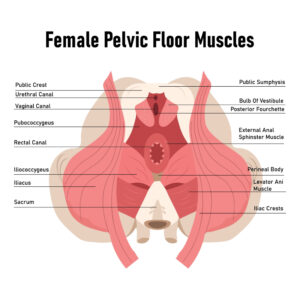Pelvic floor physiotherapy is gaining attention for its important role in women’s health. Whether you are postpartum, experiencing bladder leaks, struggling with painful periods, or wanting to strengthen your core, your pelvic floor is foundational to overall wellbeing.
Pelvic floor dysfunction is often overlooked in conventional care, despite being the root cause of many common symptoms. In this post, we will explore what pelvic floor physiotherapy is, who can benefit from it, and how it supports hormones, digestion, and the nervous system.
What Is Pelvic Floor Physiotherapy?
Pelvic floor physiotherapy focuses on the muscles, ligaments, and connective tissues of the pelvic region. These muscles support the bladder, uterus, bowel, and spine, making them essential for physical and hormonal health.

A pelvic floor physiotherapist assesses how well your pelvic floor is functioning and provides individualized exercises, release techniques, and education to improve strength, flexibility, and coordination.
Signs You May Benefit from Pelvic Floor Physio
Pelvic floor dysfunction is common, especially after pregnancy, childbirth, or during perimenopause, but it can affect women at any stage of life. You might benefit from pelvic floor physiotherapy if you experience urinary incontinence, pelvic heaviness or pressure, painful intercourse, constipation or incomplete bowel movements, lower back or hip pain, painful periods, or core weakness.
These symptoms are often your body’s way of signaling that deeper support is needed.
How the Pelvic Floor Impacts Hormones and Gut Health
The pelvic floor is part of a larger system including your core muscles, nervous system, and hormonal pathways.
During hormonal changes such as postpartum or perimenopause, fluctuating estrogen levels impact the strength and elasticity of pelvic tissues. Lower estrogen can cause tissues to weaken or become tense. Pelvic floor physiotherapy can help restore balance through targeted techniques.
The pelvic floor is also connected to the vagus nerve, which governs the parasympathetic nervous system responsible for rest and digestion. A tight or overactive pelvic floor may contribute to nervous system dysregulation, anxiety, or sleep difficulties.
Additionally, constipation and bloating are often linked to pelvic floor dysfunction. If the pelvic floor cannot relax properly, elimination can be difficult, which may impair estrogen detoxification and gut health.
What to Expect During a Pelvic Floor Physiotherapy Appointment
During your initial appointment, your therapist will review your medical history and symptoms, assess posture and movement, and may perform an internal pelvic exam with your consent. Treatment may include gentle release techniques, breathwork, and exercises. You will receive a customized home program tailored to your needs. Pelvic floor physiotherapy is gentle, informative, and empowering. It helps you reconnect with a part of your body that is often overlooked.
Holistic Support for Pelvic Wellness
At West End Women’s Health, healing is multi-layered. Many clients seeking support for hormone imbalance, bloating, or burnout benefit from working with pelvic floor physiotherapists. The pelvic floor is part of the root system that supports core stability, hormonal regulation, gut function, and emotional resilience.
The pelvic floor plays a central role in your health throughout life, not just after birth or when symptoms arise. Whether you are recovering from pregnancy, navigating perimenopause, or aiming to improve your strength and function, pelvic floor physiotherapy offers a powerful way to support your body.If you want to explore how pelvic floor therapy can complement your hormone and gut health journey, book a free discovery call. Together we can create a plan to support your body from the inside out.



